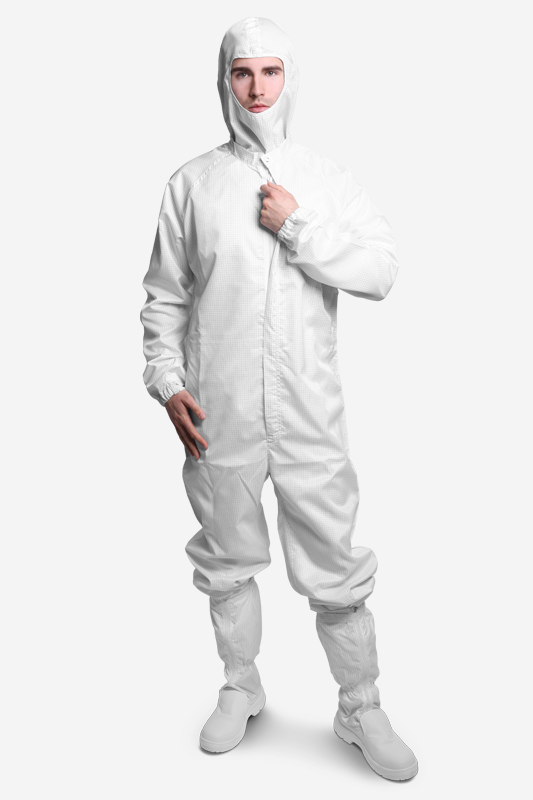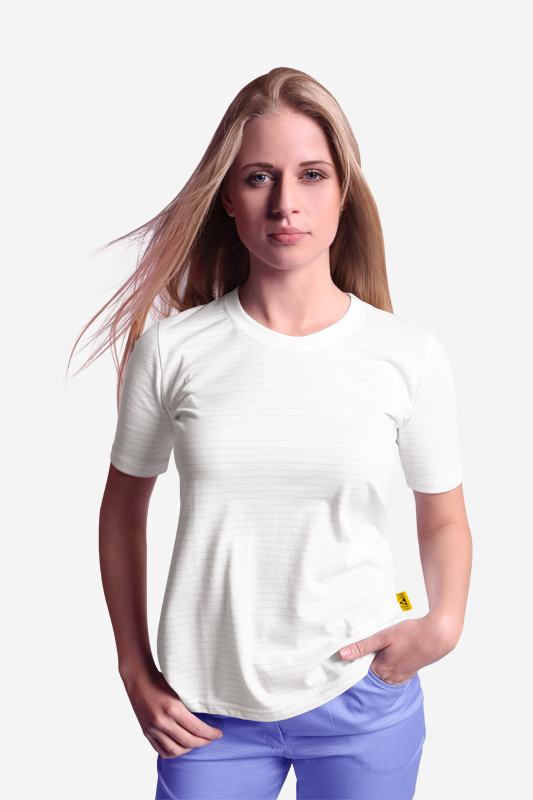A modern production or service facility is a zone filled with many devices and expensive apparatus with advanced electronics. The selection of this equipment, means of financing the purchase, methods of validation and maintenance are the decisions most often considered many times and carefully thought out.
In the multitude of decisions, the important issue of proper selection and methods of servicing the clothing is usually overlooked. The following article will present the possibilities of supplying the laboratory with products suitable for most needs. We will also point out a very advantageous (also cost-effective) method of clothing rental, combined with washing and servicing. Clothes and shoes are extremely important elements of equipment of companies from the electronic industry, as they directly affect a number of key elements crucial for the quality of production and work comfort. According to international research, about 70% of damage to electronic components is caused by incorrect personnel protection. At the same time, the damage to the elements is often not willingly caused by the operator, and most often the operator is not aware of his actions. The values of electric potentials during workstation activities range from several hundred volts to several or even several tens of kilowatts, e.g. rising from a chair will change human potential by 1.5 kV. The resulting discharges may therefore damage components and systems at the stage of their formation, testing or servicing.
However, damage may occur after an extended period of time or under adverse conditions. Electrostatic discharges can also cause device malfunctions or memory errors in programmable circuits. The required protection element is therefore special antistatic clothing with conductive fibers, which form a Faraday cage, providing protection against electrostatic discharges by damping static electric fields. Antistatic jackets, jumpers, T-shirts, trousers, overalls – the choice of clothing is very wide. When working with particularly sensitive systems, antistatic gloves with conductive fibres should also be considered.
The outfit should be complemented by antistatic shoes made of conductive material, which must remain in contact with the antistatic mat or conductive and earthed floor to ensure full protection.
HOW TO CHOOSE YOUR CLOTHING
The choice of clothing must take into account at least a few basic factors. The first is to ensure safety at work and protection of workers and to meet standards as required by law. It should be noted whether the chosen clothing is protective clothing, which is confirmed by a certificate issued by a laboratory independent of the manufacturer.
Unfortunately, it has to be stated that in the Polish reality, the certificates in which the clothing is equipped often have nothing to do with its actual parameters and legal requirements. It should be remembered that protective clothing cannot be brought into the factory if it does not meet the requirements of the law and is not sewn in a proper way. Failure to do so mainly results in serious consequences.
A separate matter is the quality of the product produced practically without any control by independent certification bodies, e.g. imported from the Far East. Other selection factors include taking into account the specific conditions of the research or production process, quality and reliability of measurements or production, methods of maintenance and washing of clothing.
This is particularly important for highly specialised clothing, e.g. clean room, where the clothing is one of the critical conditions for process efficiency and safety requirements. The last factor is to take into account the dynamics of the wearer’s movements to ensure comfortable work over many hours.
PRESELECTION ARRANGEMENTS
Actually, defining the standards that clothing must meet is not an easy task, nor is it possible to present this subject more widely in a short article. It is only necessary to mention the need for these decisions to be based on a thorough analysis of the work carried out in the laboratory, determination of harmful and hazardous factors, knowledge of legal and internal company requirements and obtaining an opinion on compliance with health and safety regulations. In practice, very often the determination of standards is conducted together with the clothing supplier.
The Reeco clothing brand is manufactured by Renex, which provides customers with free advice on product selection to process requirements and compliance with standards. Competent employees support customers by e-mail, telephone and on-site advice at the customer’s premises.
CLEANROOM CLOTHING
A separate category is clean room clothing. Dust protection is decisive here. A person entering the clean room, in a specially prepared cloakroom, has to change into a complete outfit (often including underwear) consisting of a overall, a cap with a mask, gloves and shoes. Only then they can enter the clean zone through the airlock. As you can easily imagine, working in a suit for a few hours a day can become extremely unpleasant and uncomfortable.
QUALITY OF CLOTHING AND THE CONFIDENCE OF RESEARCH AND PRODUCTION WORK
The quality of sewing and the materials used is crucial in this subject. Such a mundane problem as threads that protrude from the seams can become a serious threat, for example when a random thread enters the sample or application being prepared. A badly processed antistatic fabric that loses its properties after several washings is another common problem that affects the quality of measurements and product. There are many cases where a seemingly minor matter, such as faulty clothing, caused the effects of many months of testing to be lost and even led to a dangerous final product. You should rely on proven manufacturers who have references and certificates. These are usually companies with a long history, which will select or produce clothing for specific needs. Clothing is an important part of equipment and it is a mistake to choose it without analysis.
ECONOMY AND SENSE – RENTAL OF CLOTHING
It would seem that washing and servicing clothes are separate tasks. However, washing specialised clothing on your own is usually the worst of the solutions, and its drawbacks quickly become obvious. Above all, a worker in a domestic environment is not able to carry out the laundry in a way that ensures its continued proper functioning.
Clothing will very quickly lose its antistatic properties, and certainly will not be able to be used in clean areas. The special washing process, which takes place in rooms with controlled environmental parameters, guarantees full monitoring of dust and dirt contamination, which is essential for the electronics, pharmaceutical, biotechnology and optical industries.
Such conditions are only provided by laundries built in clean rooms. Such a laundry operates also in Poland, and the level of cleanliness is controlled by a monitoring system in terms of air exchange rate per 1h, temperature, humidity, overpressure in the room and the number of particles of 0.3-5.0 µm. Clean room clothing can be washed only in this standard and in controlled conditions according to ISO 14644 or GMP (Good Manufacturing Practice).
Otherwise, the clothing will become dusty and its use in the clean zone will reduce the cleanliness class and reduce the effects of work. Industrial laundry is usually combined with a rental service, not a purchase of clothing. It is a very beneficial service, popular for years with our western and northern neighbours, and in Poland it is becoming very popular for practically every kind of laboratory, protective and working clothes.
This was determined primarily by the efficiency and cost-effectiveness of this solution. The system was constructed in such a way that when one piece of clothing was in use, the second one was available in a worker’s locker and the third one was washed (other variants are acceptable). Weekly replacements eliminate problems with dirty clothes or lack of them.
As the customer is not charged for the purchase of the clothes, but only for their rental combined with the laundry service, this solution is astonishingly advantageous, especially when compared to the purchase of clothes and the laundry detergent. In addition, the garments are serviced at all times, which means their professional repair and disposal. In such a cycle the clothes can be used in good condition for up to 5 years. Clothing in this system is electronically supervised, customers can check online its condition, stage of use, cycle in circulation. We gain full control over an important piece of equipment and can eliminate most of the logistical and service problems, while reducing costs, sometimes significantly.
To sum up, it should be stated that using proven, professional solutions, we are able to receive clothing prepared according to our needs, in accordance with the applicable standards and without any onerous difficulties related to its maintenance in the required condition. Always take notice that the clothing you use is equipped with the required, credible certificates. It is well worth to entrust this task to professional entities.


